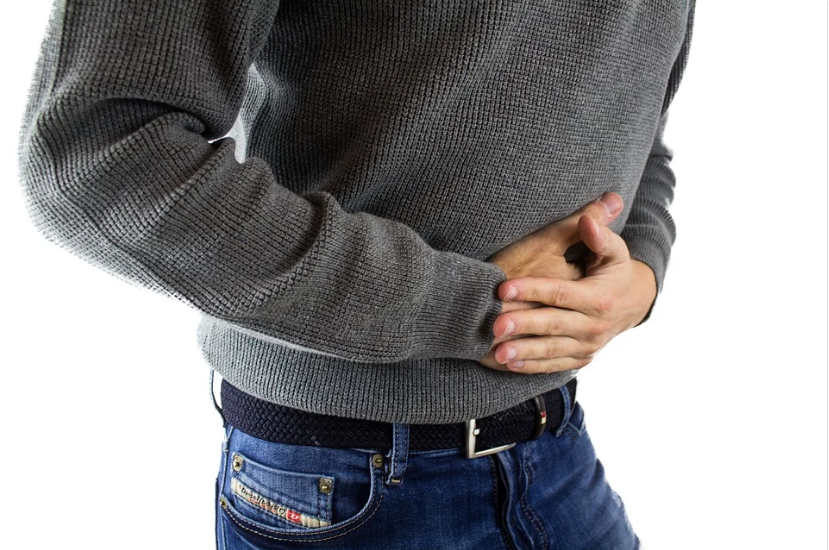What do we understand by the term Abdominal bloating?
Abdominal bloating is a common clinical condition that is rarely dangerous but it causes discomfort. It is common in both men and women and is not age-centric. Anyone can report this condition irrespective of gender or age. Abdominal bloating generally associates with abdominal distention. Abdominal distention is a condition where you can see and feel an increase in abdominal girth.

Do you ever feel your abdomen swelling up and you all of a sudden start feeling heavy? The distention of the abdomen is so visible that you start feeling uncomfortable. Generally people report such discomfort after having meals or maybe by the end of the day. This swelling up of your abdomen and a visible distention is known as bloating. Now you must wonder why it happens? Well, bloating is one of the major symptoms reported by the people suffering from gut disorders, and the most common of all these disorders is IBS (irritable bowel syndrome).
What is IBS? Irritable bowel syndrome is a common disorder that affects the large intestine.
IBS is a condition characterized by unexplained abdominal discomfort or pain which associates with changes in bowel habits. Other common symptoms include gas, bloating, diarrhoea and constipation, and increased GI distress associated with psychosocial distress.
Learn more about what IBS is and how to manage it.
Abdominal bloating
Bloating can be defined as a sense of gassiness or a sense of being distended where measurable distention does not have to occur. You may or may not be able to measure the distention and therefore, the term abdominal distention should be used for those people who show a visible increase in abdominal girth.
Let us try to understand the diagnostic criteria for bloating.
Rome III for functional bloating:
- Recurrent feeling of bloating or visible distention for at least 3 days per month
- Onset of symptoms at least 6 months prior to diagnosis
- Presence of symptoms for at least 3 months
- Insufficient criteria to establish a diagnosis of irritable bowel syndrome, functional dyspepsia, or any other functional gastrointestinal disorder
Many people also suffer from other symptoms such as burping, well this should not be gel up with bloating and it should be monitored to rule out the actual condition.
Why is bloating bad?
Well, on top of all the reasons, bloating creates distress. Let’s just assume that you start your day with energy and a positive feeling. You have your meal, work on your usual stuff and by evening you start feeling abdominal discomfort with a visible distention. In such a situation, you will start feeling stressed. Not only does the person feel distress, but the quality of life also suffers.
The diagnosis and treatment of bloating is not completely understandable by researchers. But in the past decade, there has been intensive research on bloating, IBS, flatulence and other gut disorders to understand these conditions more properly.
Pathophysiology of bloating
Pathophysiology is very important to understand the cause of the condition. It relates pathology with physiology so that we can get a better understanding of what goes on inside our body and what results in the disease condition.
The pathophysiology of gas and bloating is quite complicated. We need to relate and understand the gut microflora, intestinal transit, gas production, etc.
Gut microflora:
Gut microflora or gut microbiome are the bacteria that reside in our intestinal tract. They have an impact on not only gut health but on the whole body. This microflora varies from one person to another and it is more than the total number of cells in the human body. As the colonic microflora varied from one person to antoher, less research is available for the same. Do you know that these bacterias play an important role in maintaining immune health of the gut, production of short-chain fatty acids and even these can control the obesogenic factors. They also have an impact on gas production. If there is a minor disturbance in the gut microflora, it can lead to gut malfunctioning which also includes gas production.
Intestinal gas:
At any point of time, the average individual has around 100-200 cc of gas within the gastrointestinal tract. Volume and composition of human intestinal gas determined by …. The volume of gas increases after consuming meals. Let’s try to understand this mechanism. We just learned that 100-200 cc of gas is present in the GI tract at any time. When we consume meals, digestion takes place and post-prandial this volume of gas increases. It depends on the individual how much postprandial gas will be there. Also, the colonic gas production depends on the gut microflora. These bacteria metabolize different components and as a result gas is produced. Now, during digestion and metabolism, the gastric distention and the movement of small intestines make sure to accelerate the process of gas transit. When there are some disturbing or delaying factors present for such movements, gas retention may take place leading to discomfort.
The 5 most common gases present within the GI tract are nitrogen, oxygen, carbon dioxide, hydrogen and methane. Most of the carbon dioxide is absorbed by the small intestine.
One cannot define how much gas production is normal and how much is abnormal for human beings. It is individualised and therefore what seems abnormal for one person might feel normal for another. Bloating is more of a sensory phenomenon and therefore we cannot measure it exactly.
What can we do to treat bloating?
The best way to treat bloating and abdominal distention is to understand the underlying cause of the problem. When you try to understand the chief symptoms and the cause behind them, then you can easily manage bloating and abdominal distention.
A person suffering from bloating should know the pathophysiology of the same, so that a clear picture is formed in the mind of the patient and how to handle the condition seems easy.
Diet:
Food is something that we all cherish irrespective of any other factors. Diet is an integral part of our daily routine and therefore, understanding your diet is one of the crucial steps in managing bloating. Ideally the dietician should take a thorough look at the dietary history and habits of the individual and should focus more on the foods which are fermented in the colon ( dairy, fructose, fructans, fibre and sorbitol). To better understand what these foods mean and how a low FODMAP diet works, read through FODMAP diet.
Now, you must wonder how to manage a diet to improve bloating?
Well, the answer to this question is quite simple. All you have to do is to eliminate a food group at one time and see if the symptoms improve. Such diets are generally called elimination diets or hit and trial methods. One food group is eliminated at one time, let’s say dairy is eliminated from your diet, then your dietician will see if the symptoms improve or they’re still the same. In the similar manner other food groups are eliminated and re-introduced depending upon the status of the symptoms.

What works for one person may not work in case of another and therefore, such elimination diets are on individual basis.
Exercise and posture:
You might have noticed that when you’re in a supine position, the symptoms of bloating worsens as compared to an upright position. Well, posture plays a great role in managing bloating symptoms. Individuals suffering from bloating should know that exercise and posture can help reduce the frequent episodes of bloating in a day.

A light exercise or maybe a walk can help you ease out the gas produced in the body. Make sure to not lay in a supine position after having meals.
Probiotics:
You must be aware of the term probiotics. Well, probiotics are the live microorganisms that intend to give health benefits to the host when consumed in adequate amounts. In many randomize trials, researchers observe that an adequate amount of probiotics can significantly improve bloating and flatulence in IBS patients. Probiotics promote the health of gut microbiota, which in return make sure to improve gut health. It is more of a domino effect, probiotics work on your gut microbiome health and as a consequence the bacteria make work on the normal functioning of the colon which reduces bloating and abdominal distention.
Lactose intolerance and gluten sensitivity:
Apart from identifying the cause of bloating and trying elimination diets, you should also check for some common conditions such as lactose intolerance and gluten sensitivity. Many people are unaware of the fact that they are lactose intolerant or have gluten sensitivity. Our food practices are such that milk and wheat are most commonly consumed foods in every household.
Lactose intolerance is a condition in which the body is not able to fully digest lactose in dairy products. It is due to the deficiency of an enzyme called lactase. Consumption of milk causes symptoms like abdominal cramps, discomfort, diarrhoea, and bloating. Fermented forms of milk such as curd and paneer are better tolerated in place of milk. During childhood, the production of the enzyme lactase is maximum. As we age, most people are not able to produce enough lactase to digest lactose. Therefore, it is important to understand whether your bloating is a result of lactose intolerance.

On the other hand, gluten intolerance or sensitivity is an immune response that takes place on consumption of gluten (a protein found in wheat, barley and rye). Symptoms generally include diarrhoea, abdominal discomfort, fatigue and bloating. The treatment includes following a strict gluten-free diet for the rest of the life.

Apart from these treatments, over the counter medications are also available to treat bloating. But such medications shall only be follow on doctor’s prescription.
Bottom line:
Bloating and abdominal distention are very common symptoms and affect the quality of life of an individual. It is very important to understand the underlying cause of bloating to treat and manage it effectively. Diet along with exercise and correct posture can help you manage it.
If you are struggling shedding weight. You can talk to us by taking this assessment: Click here
For more information click here

